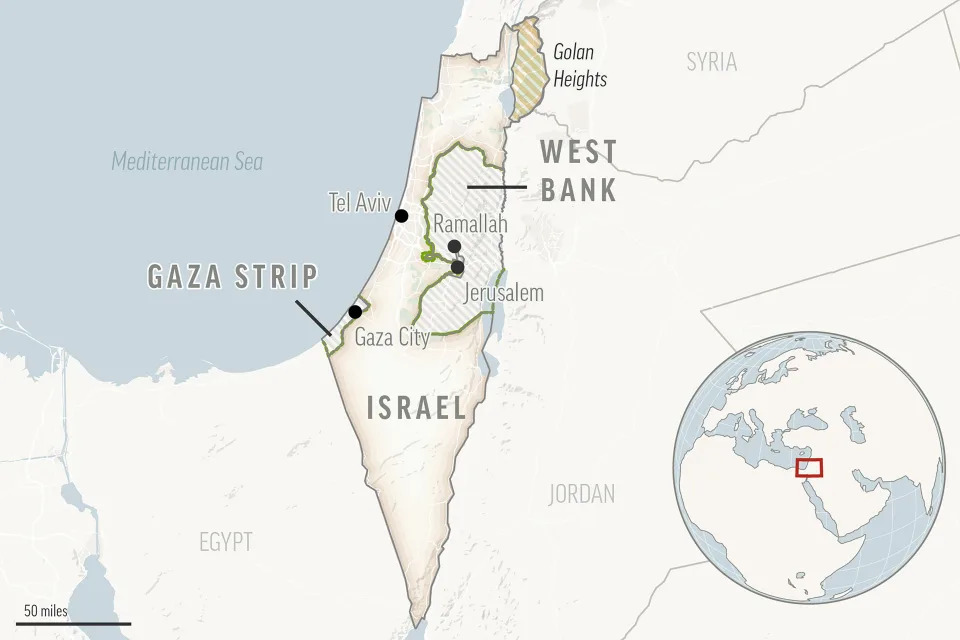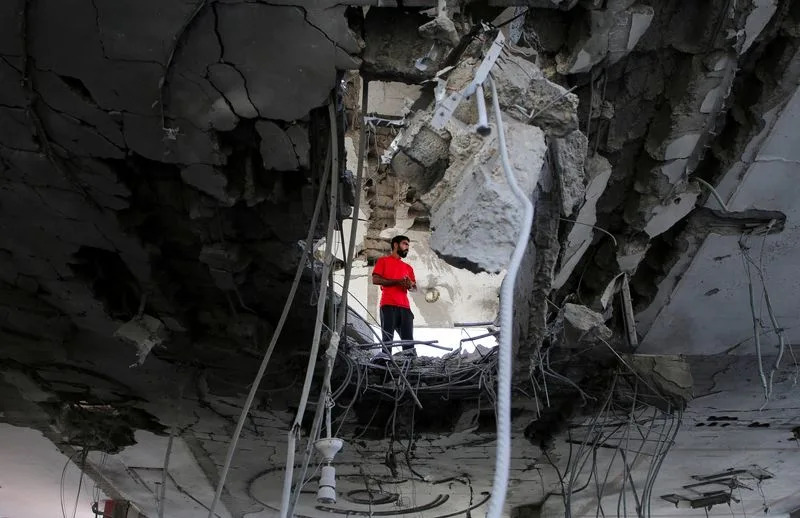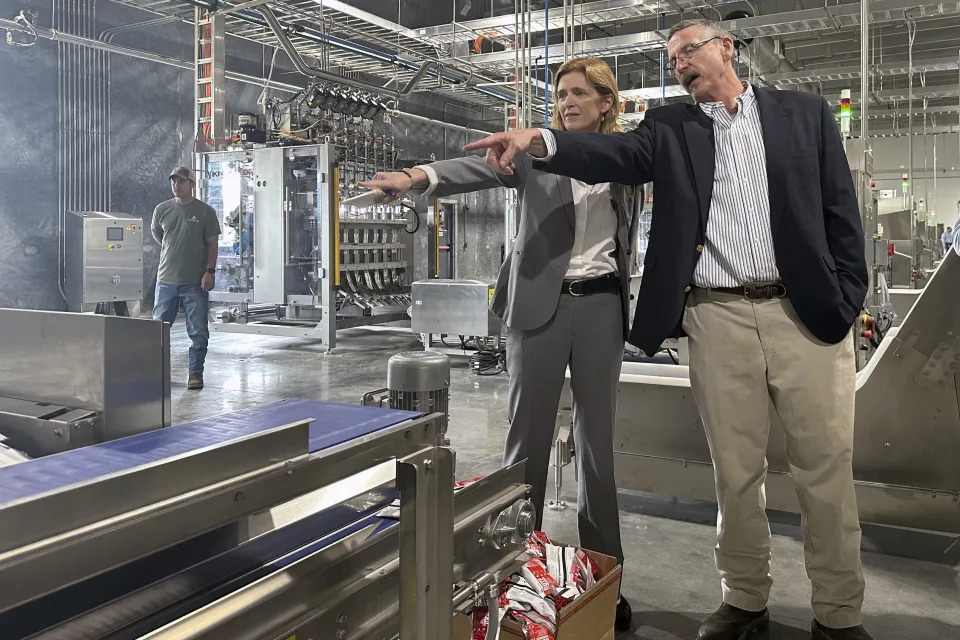There's progress reported in Gaza truce talks, but Israel downplays chances of ending war with Hamas

A Hamas delegation was in Cairo on Saturday as Egyptian state media reported “noticeable progress” in cease-fire talks for Gaza. But Israel hasn’t sent a delegation and a senior Israeli official downplayed prospects for a full end to the war while emphasizing the commitment to invading Rafah.
Pressure has mounted to reach a deal halting the nearly 7-month-long war. A top U.N. official says there is now a “ full-blown famine” in northern Gaza, while the United States has repeatedly warned close ally Israel about its planned offensive into Rafah, the southernmost city on the border with Egypt, where more than 1 million Palestinians are sheltering.
Egyptian and U.S. mediators have reported signs of compromise in recent days, but chances for a cease-fire deal remain entangled with the key question of whether Israel will accept an end to the war without reaching its stated goal of destroying the militant group Hamas.
Egypt’s state-owned Al-Qahera News TV channel said that a consensus had been reached over many disputed points but did not elaborate. Hamas has called for a complete end to the war and withdrawal of all Israeli forces from Gaza.
Get AfriPrime Android Web View app....Click the link to Amazon app store to download https://rb.gy/3xek46
A senior Israeli official, speaking on condition of anonymity to discuss ongoing negotiations, played down the prospects for a full end to the war. The official said Israel was committed to the Rafah invasion and that it will not agree in any circumstance to end the war as part of a deal to release hostages.
Israeli media said that statement had been dictated by Prime Minister Benjamin Netanyahu, whose government could be threatened if he agrees to a deal because hard-line Cabinet members demand an attack on Rafah.
The proposal that Egyptian mediators had put to Hamas sets out a three-stage process that would bring an immediate, six-week cease-fire and partial release of Israeli hostages, and would include some sort of Israeli pullout. The initial stage would last for 40 days. Hamas would start by releasing female civilian hostages in exchange for Palestinian prisoners held by Israel.
Some families of hostages accused Netanyahu of prolonging the war for his political interests. Daniel Elgert, whose brother Itzhak is held by Hamas, addressed Netanyahu at the latest rally in Tel Aviv: “Bibi, we call on you from here to announce the end of the war in exchange for the return of all the hostages. The war is effectively over, we know it’s over, you can’t fool us."
The war has killed more than 34,000 Palestinians, according to Gaza’s local health officials, caused widespread destruction and plunged the territory into an unprecedented humanitarian crisis.
The conflict erupted on Oct. 7, when Hamas attacked southern Israel, abducting about 250 people and killing around 1,200, mostly civilians. Israel says militants still hold around 100 hostages and the remains of more than 30 others.
Israeli strikes Saturday on Gaza killed at least six people. Three bodies were recovered from the rubble of a building in Rafah and taken to Yousef Al Najjar hospital. A strike in the Nuseirat refugee camp in central Gaza killed three people, according to hospital officials.
In the last 24 hours, the bodies of 32 people killed by Israeli strikes have been brought to local hospitals, Gaza’s Health Ministry said Saturday. The ministry does not distinguish between fighters and civilians in its tallies but says that women and children make up around two-thirds of those killed.
The Israeli military says it has killed 13,000 militants, without providing evidence to back up the claim.
It has also conducted mass arrests during its raids inside Gaza. The territory's Health Ministry urged the International Criminal Court to investigate the death in Israeli custody of a Gaza surgeon. Adnan al-Borsh, 50, was working at al-Awda Hospital when Israeli troops stormed it in December, according to the Palestinian Prisoner’s Club.
The United Nations has warned that hundreds of thousands would be “at imminent risk of death” if Israel's military moves forward into densely packed Rafah, which is also a critical entry point for humanitarian aid. Israel has briefed U.S. officials on its plan to evacuate civilians.
The director of the U.N. World Food Program, Cindy McCain, said Friday that trapped civilians in the north, the most cut-off part of Gaza, have plunged into famine. McCain said a cease-fire and a greatly increased flow of aid through land and sea routes was essential.
Get AfriPrime Android Web View app....Click the link to Amazon app store to download https://rb.gy/3xek46
A Israeli humanitarian official on Saturday called McCain's assertion incorrect and said Israel has been facilitating the delivery of more aid. The official spoke on condition of anonymity because of the sensitivity of the situation.
Israel recently opened new crossings for aid into northern Gaza, but on Wednesday, Israeli settlers blocked the first convoy before it crossed into the besieged enclave. Once inside Gaza, the convoy was commandeered by Hamas militants, before U.N. officials reclaimed it.
Some displaced residents of northern Gaza said they had been skipping meals and hadn't seen vegetables for weeks.
“You know now everything is scarce in Gaza. There are no vegetables and there is no aid or food packages. It is about once a month that we get food parcels,” Marwan Al-Zaid said.
In the Israeli-occupied West Bank, where tensions have been high since the outbreak of the war in Gaza, the Israeli military said it and Shin Bet had killed five fighters in Tulkarem, asserting the fighters had opened fire. Palestinian authorities said five people were killed by Israeli fire in the town of Deir al-Ghusun, roughly 7 kilometers (4.3 miles) northeast of Tulkarem.
High-stakes hostage and ceasefire talks in Egypt
Hamas delegation has arrived in Cairo for talks aimed at reaching a possible truce in Gaza..
Hamas, CIA director to hold talks in Cairo on Gaza truce
A person stands inside a building, damaged in an Israeli strike, amid the ongoing conflict between Israel and the Palestinian Islamist group Hamas, in Rafah.
Hamas said on Friday it was sending a delegation to Cairo to discuss a deal for a truce and the release of hostages in Gaza, hours after U.S. CIA Director William Burns arrived in the Egyptian capital, according to Egyptian sources.
Egypt, along with Qatar and the United States, has been leading efforts to mediate between Israel and Hamas to broker a deal for a ceasefire in the conflict that began on Oct. 7.
The Hamas and CIA officials will meet Egyptian mediators on Saturday, an Egyptian security source said, though it was unclear whether they would meet separately or together.
Hamas said its delegates were traveling to Cairo in a "positive spirit" after studying the latest proposal for a truce agreement.
"We are determined to secure an agreement in a way that fulfils Palestinians' demands," the Palestinian militant group said in a statement.
A U.S. official said the United States believed there had been some progress in talks but was still waiting to hear more.
The CIA declined to comment, reflecting its policy of not disclosing the director's travel.
Ceasefire talks have continued for months without a decisive breakthrough. Israel has said it is determined to eliminate Hamas, while Hamas says it wants a permanent ceasefire and a full Israeli withdrawal from Gaza.
Get AfriPrime Android Web View app....Click the link to Amazon app store to download https://rb.gy/3xek46
Egypt made a renewed push to revive negotiations late last month. Cairo is alarmed by the prospect of an Israeli ground operation against Hamas in Rafah in southern Gaza, where more than 1 million people have taken shelter near the border with Egypt's Sinai Peninsula.
Egyptian sources say both sides have made some concessions recently, leading to progress in the talks, though Israel has continued to say an operation in Rafah is imminent.
The war began after Hamas staged a cross-border raid on Oct. 7 in which 1,200 people in southern Israel were killed and 253 hostages taken, according to Israeli tallies.
More than 34,000 Palestinians have been killed and more than 77,000 have been wounded by Israeli fire during a campaign that has laid waste to the coastal enclave, according to Gaza's health ministry.
A major Israeli operation in Rafah could deal a huge blow to fragile humanitarian operations in Gaza and put many more lives at risk, according to U.N. officials.
Hopes for Gaza cease-fire surge with new negotiation round; Israel downplays progress
Hopes for a Gaza cease-fire surged Saturday as a Hamas delegation arrived in Egypt for negotiations on a deal to release long-held hostages, but Israeli officials downplayed the possibility.
Egyptian and U.S. mediators have brokered the peace talks in Cairo with CIA director Bill Burns arriving Friday in the capital city.
U.S. President Joe Biden has also been directly involved in cease-fire talks.
An existing proposal put forth by Egyptian officials would see Hamas release the remaining hostages being held in Gaza.
Egyptian media reported Saturday that Hamas representatives were taking a "positive" tone ahead of negotiations.

"We are determined to secure an agreement in a way that fulfills Palestinians' demands," the militant said in a statement.
However, an Israeli delegation is not expected to head to Cairo until Hamas responds to the proposal, the Jerusalem Post reported, citing a story originally published by Israel's English language public broadcaster KAN English News.
Israeli Prime Minister Benjamin Netanyahu opposed the delegation's trip to Egypt, according to the newspaper.
The first phase of the cease-fire deal would reportedly see Hamas agree to the humanitarian release of hostages minus an official commitment from Israel to end the war.
Netanyahu has repeatedly insisted the Israel Defense Forces will conduct a ground operation in the southernmost Gaza city of Rafah to "eliminate the [Hamas} battalions there." The militant group has dug in around the city of 1.2 million, with many of Rafah's residents already displaced in the Palestinian enclave.
Such an incursion in Rafah "could lead to a slaughter," the United Nations Office for the Coordination of Humanitarian Affairs said Friday.
Get AfriPrime Android Web View app....Click the link to Amazon app store to download https://rb.gy/3xek46
On Tuesday, Netanyahu made it clear an invasion of Rafah will go forward independent of negotiations to free hostages held in captivity by Hamas.
Netanyahu has also previously said there can be no negotiations until all the remaining hostages are freed.
The IDF estimates that around 130 hostages are still being held captive by Hamas, though a number of them are believed to be dead. They were originally kidnapped by Hamas during its bloody Oct. 7 surprise attack.
A senior UN official says northern Gaza is now in 'full-blown famine'
USAID Administrator Samantha Power talks with Mana operations director Harry Broughton during a tour of its factory in Fitzgerald, Ga., that produces emergency nutritional aid for starving children, on Friday, May 3, 2024. Power announced USAID is investing $200 million to increase nutritional aid for starving children in Gaza, Sudan and other places where conflict has increased needs.
A top U.N. official said Friday that hard-hit northern Gaza was now in “full-blown famine" after more than six months of war between Israel and Hamas and severe Israeli restrictions on food deliveries to the Palestinian territory.
Cindy McCain, the American director of the U.N. World Food Program, became the most prominent international official so far to declare that trapped civilians in the most cut-off part of Gaza had gone over the brink into famine.
“It’s horror," McCain told NBC's “Meet the Press” in an interview to air Sunday. “There is famine — full-blown famine — in the north, and it’s moving its way south."
She said a cease-fire and a greatly increased flow of aid through land and sea routes was essential to confronting the growing humanitarian catastrophe in Gaza, home to 2.3 million people.
There was no immediate comment from Israel, which controls entrance into Gaza and says it is beginning to allow in more food and other humanitarian aid through land crossings.
The panel that serves as the internationally recognized monitor for food crises said in March that northern Gaza was on the brink of famine and likely to experience it in May. Since March, northern Gaza had not received anything like the aid needed to stave off famine, a U.S. Agency for International Development humanitarian official for Gaza told The Associated Press. The panel's next update will not come before this summer.
The USAID official said on-the-ground preparations for a new U.S.-led sea route were on track to bring in more food — including treatment for hundreds of thousands of starving children — by early or mid-May. That's when the American military expects to finish building a floating pier to receive the shipments.
Get AfriPrime Android Web View app....Click the link to Amazon app store to download https://rb.gy/3xek46
Ramping up the delivery of aid on the planned U.S.-backed sea route will be gradual as aid groups test the distribution and security arrangements for relief workers, the USAID official said.
The official spoke on condition of anonymity, citing security concerns accompanying the official's work on conflicts. They were some of the agency’s first comments on the status of preparations for the Biden administration’s $320 million Gaza pier project, for which USAID is helping coordinate on-the-ground security and distribution.
At a factory in rural Georgia on Friday, USAID Administrator Samantha Power pointed to the food crises in Gaza and other parts of the world as she announced a $200 million investment aimed at increasing production of emergency nutritional paste for starving children under 5.
Power spoke to factory workers, peanut farmers and local dignitaries sitting among pallets of the paste at the Mana nonprofit in Fitzgerald. It is one of two factories in the U.S. that produces the nutritional food, which is used in clinical settings and made from ground peanuts, powdered milk, sugar and oil, ready to eat in plastic pouches resembling large ketchup packets.
“This effort, this vision meets the moment,” Power said. "And it could not be more timely, more necessary or more important.”
Under pressure from the U.S. and others, Israeli officials in recent weeks have begun slowly reopening some border crossings for relief shipments.
But aid coming through the sea route, once it's operational, still will serve only a fraction — half a million people — of those who need help in Gaza. Aid organizations including USAID stress that getting more aid through border crossings is essential to staving off famine.
Children under 5 are among the first to die when wars, droughts or other disasters curtail food. Hospital officials in northern Gaza reported the first deaths from hunger in early March and said most of the dead were children.
Power said the U.N. has called for 400 metric tons of the nutritional paste “in light of the severe hunger that is pervading across Gaza right now, and the severe, acute humanitarian crisis.” USAID expects to provide a quarter of that, she said.
Globally, she said at the Georgia factory, the treatment made there “will save untold lives, millions of lives.”
USAID is coordinating with the World Food Program and other humanitarian partners and governments on security and distribution for the pier project, while U.S. military forces finish building it. President Joe Biden, under pressure to do more to ease the humanitarian catastrophe in Gaza as the U.S. provides military support for Israel, announced the project in early March.
U.S. Central Command said in a statement Friday that offshore assembly of the floating pier has been temporarily paused due to high winds and sea swells, which caused unsafe conditions for soldiers. The partially built pier and the military vessels involved have gone to Israel's Port of Ashdod, where the work will continue.
Get AfriPrime Android Web View app....Click the link to Amazon app store to download https://rb.gy/3xek46
A U.S. official said the high seas will delay the installation for several days, possibly until later next week. The official, who spoke on condition of anonymity to discuss operation details, said the pause could last longer if the bad weather continues because military personnel and divers have to get into the water for the final installation.
The struggles this week with the first aid delivery through a newly reopened land corridor into north Gaza underscored the uncertainty about security and the danger still facing relief workers. Israeli settlers blocked the convoy before it crossed Wednesday. Once inside Gaza, the convoy was commandeered by Hamas militants, before U.N. officials reclaimed it.
In Gaza, the nutritional treatment for starving children is most urgently needed in the northern part of the Palestinian territory. Civilians have been cut off from most aid supplies, bombarded by Israeli airstrikes and driven into hiding by fighting.
Acute malnutrition rates there among children under 5 have surged from 1% before the war to 30% five months later, the USAID official said. The official called it the fastest such climb in hunger in recent history, more than in grave conflicts and food shortages in Somalia or South Sudan.
One of the few medical facilities still operating in northern Gaza, Kamal Adwan hospital, is besieged by parents bringing in thousands of children with malnutrition for treatment, the official said. Aid officials believe many more starving children remain unseen and in need, with families unable to bring them through fighting and checkpoints for care.
Saving the gravely malnourished children in particular requires both greatly increased deliveries of aid and sustained calm in fighting, the official said, so that aid workers can set up treatment facilities around the territory and families can safely bring children in for the sustained treatment needed.
- Questions and Answers
- Opinion
- Story/Motivational/Inspiring
- Technology
- Art
- Causes
- Crafts
- Dance
- Drinks
- Film/Movie
- Fitness
- Food
- Jeux
- Gardening
- Health
- Domicile
- Literature
- Music
- Networking
- Autre
- Party
- Religion
- Shopping
- Sports
- Theater
- Wellness
- News
- Culture
- War machines and policy





